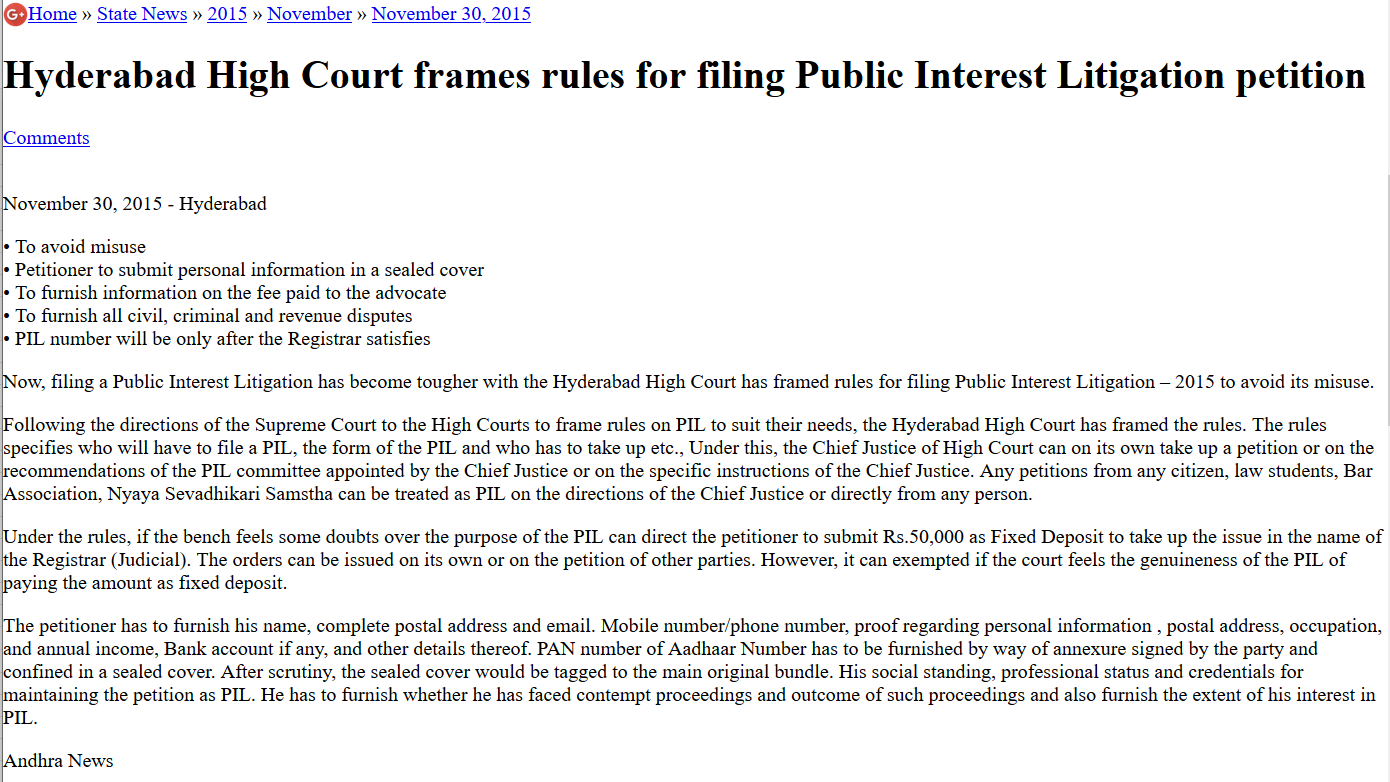Let’s look at the high level stages in filing a WP-PIL into AP High Court until its’ disposal. Take a look at my file disposed PIL here, for reference and original case documents.
Journey of Idea to Petition
This is a interesting journey from the birth of an idea to eradicate a social evil to turning this idea into a Court-Acceptable Petition. Of Course, one can write a letter and email/post to the Contact address of a High Court (Info here) or Supreme Court (Info here).
Ideation
Look around you. Tell me in which aspect of life, there is no problem. So once you find a problem, you need to know where is the ideal solution lie. Meaning, which part of the Government has the responsibility to fix the problem. This will give answers to what exactly goes into your Prayers and Respondents sections of the WP-PIL.
Who can be a Petitioner in a WP-PIL?
Any public spirited person can espouse any cause impacting any sphere of the life of general public. But the Constitutional Courts (Supreme Court and High Courts) expect the petitioner capable enough to do details research, within his capacity, on the issue being raised and propose one (or more) solutions which would address the issue raised. Since a PIL ‘is NOT a adversary litigation but it is a challenge and an opportunity to the government and its officers to make basic human rights meaningful to the deprived and vulnerable sections of the community and to assure them social and economic justice which is the signature tune of our Constitution.‘
As with anything open to public, even PIL are misused and often criticized by Judiciary as Publicity Interest Litigation. Thereafter, Supreme Court [in State Of Uttaranchal vs Balwant Singh Chaufal Ors on 18 January, 2010] directed High Courts to frame rules to be followed by those coming forward to file PILs, to make them responsible for adverse consequences in case their PILs are held to be frivolous or motivated.

Format of a WP-PIL
Each High Court prescribes certain guidelines and a format to be followed while drafting the WP Petition and Affidavit. Additionally, it may require the petitioner to file along, more affidavits declaring various aspects corresponding to various rules. Here is the AP/TS PIL Rules 2015
2015-09-02 High Court of AP, Public Interest Litigation Rules, 2015Drafting of a WP-PIL
There is no hard and fast rule for drafting. Emphasis must be on explaining the issue briefly under various heads of the PIL format and support the issue with as much evidence as possible from our research. Propose how your solutions are supported under various provisions of laws and principles of natural justice. Objective is to make it lucid enough for the Court (most probably Court-1/Chief Justice Court) to grasp the crux of the issue in one hearing itself.
Filing of a WP-PIL
Once the WP-PIL is drafted, reviewed (as many times as necessary), have it printed and filed into the Court. In most High Courts, the PILs are handled by the Division Bench headed by the Chief Justice of that High Court. Many two copies for the Bench. Make as many extra copies as there are Respondents, except where if same government advocate is going to represent more than one respondent. Make copies of ALL the material papers (technical word for bundle of Annexures) to go with above copies of petitions. You can make good use of the filing clerks in/around the High Court premises. This may become redundant, once paperless Courts become a reality!
There will be a section/wing within Filing Section of the High Court, which accepts and scrutinizes the draft. The section staff will assign a SR number to the bundle as a temporary identifier. If there are any objections/questions from the Scrutiny officer, the bundle will be returned to you (via Returns Section) for you to rectify and re-file the bundle. Once this exercise completes, your PIL will get a final case number.
The Scrutiny officer may want some approval from the Registrar (Judicial) to allow you to appear and argue your own PIL, as petitioner. It may be not required, if you are an advocate. The point here is the person arguing the matter/case, must be competent to assist the Court.
Listing of a WP-PIL
Most probably, the PIL will be listed before the Court-1 (or whichever Court looks into PILs in that High Court) and the business of the day will be to hear the petitioner and make an assessment if notices need to be issued to the respondents or can the PIL be disposed off at this admission stage itself. If the notices are not issued, it is most certain that the PIL was dismissed, for reasons best known to the bench and mentioned in the dismissal order. Like I came to know in above mentioned WP-PIL.
Otherwise, the respondents will have a total of 120 days to respond to the PIL, by filing their Counters. This is as per the AP High Court WP Proceedings 1977 available here. Other High Court have different Rules. Check that High Court’s website or the Filing Section in person. It is another matter that in AP High Court, Court-1 does not see any urgency, when advocates bring to the notice of the Court that the respondents already are in violation of this Rule 12. The Chief Justice himself commented to me in open Court, that there are cases pending even before my case. I am not sure, if this is a matter of pride or shame! I can not stand the lack of empathy towards the WPs filed as PILs here.
Disposal of a WP-PIL
Depending on the issue raised in the PIL petition, the case moves to the next stages involving weighing the contents and objections of the Counters filed by the respondents and the Bench may pass intermittent Orders to unearth the real issues and ways to effectively eradicate them.
Index of various other Life Cycles here.